Author | Dan Morehead, Founder of Pantera
Compiled by Wu Talks about Blockchain
Original link:
https://panteracapital.com/blockchain-letter/1000x-pantera-bitcoin-fund/
The post-election rally boosted the fund by a further 30%, bringing the fund's total return to 131,165% before fees and expenses.
I want to share the original logic - because it is still very convincing to me today.
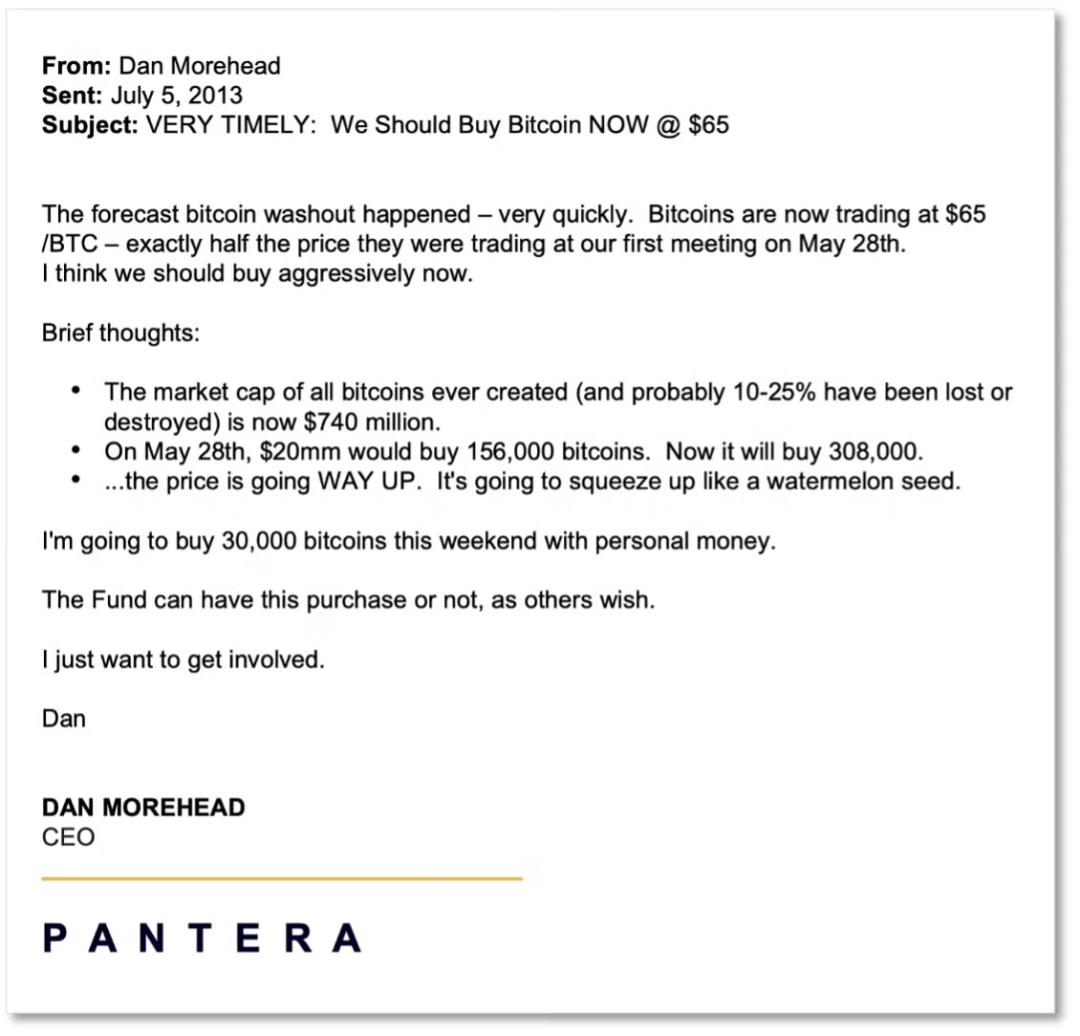
The day we chose to launch the Pantera Bitcoin Fund was actually the lowest point in the past eleven years.
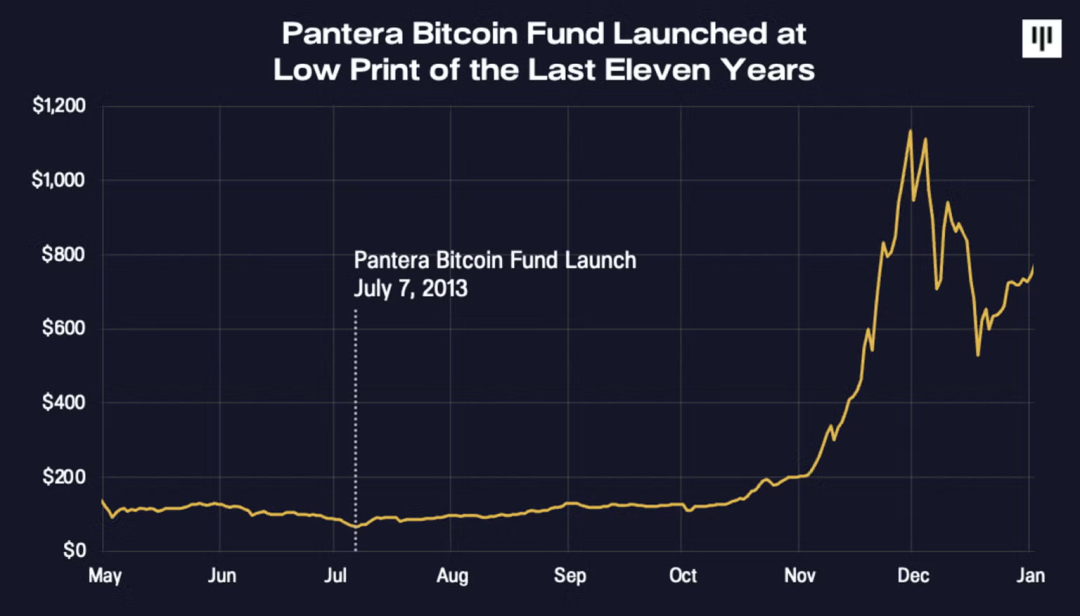
That first investment memo still reads clearly today.
From 2013 to 2015, we purchased 2% of the world's Bitcoin.
PS: If Pantera purchased 2% of the world's bitcoins from 2013 to 2015, it would be estimated to be around 280,000 bitcoins. In contrast, as of November 24, 2024, MicroStrategy holds 386,700 bitcoins.
Even after eleven years, Bitcoin is still being squeezed upward like a watermelon seed.
Frankly, I can't help but think that we still have many years of very attractive returns.
Gold from 1000 BC
My core point was written a month later:
“I was discussing Bitcoin with an investor yesterday and he responded somewhat dismissively, ‘It’s like buying gold.’ No, no, it’s like buying gold in 1000 BC. 99% of financial wealth is not in Bitcoin yet. When they start, Bitcoin will either be worthless or [go orders of magnitude higher].”
As an industry, we have made some progress. Now, only “about” 95% of financial wealth is not fully deployed.
The catalyst for the change from 5% in 2024 to a higher percentage has just happened: regulatory clarity in the U.S. Large institutional managers like BlackRock, Fidelity, and others now offer extremely cheap, efficient access to Bitcoin for anyone with a brokerage account. This new convenience will ultimately allow tens of millions of investors and individuals to gain access to this important new asset class.
We believe the industry as a whole will benefit greatly from the first pro-blockchain U.S. president taking office. In our view, the success of blockchain is in the best interest of the country, and we believe everyone in Congress will eventually take a neutral or pro-blockchain stance — a trend that has already begun. 15 years of regulatory headwinds for blockchain are turning into tailwinds.
I still fervently believe what I wrote eleven years ago:
“I think the chances of global adoption of a global currency/payment system where free cryptography replaces the high ‘trust’ fees charged by banks Visa-MasterCard/Western Union/PayPal etc. Bitcoin replaces cash, electronic fiat, gold, bearer bonds, big stone plates etc. It does all of these things. It is the first global currency since gold. It is the first ever borderless payment system.”
The price of Bitcoin is currently $104.
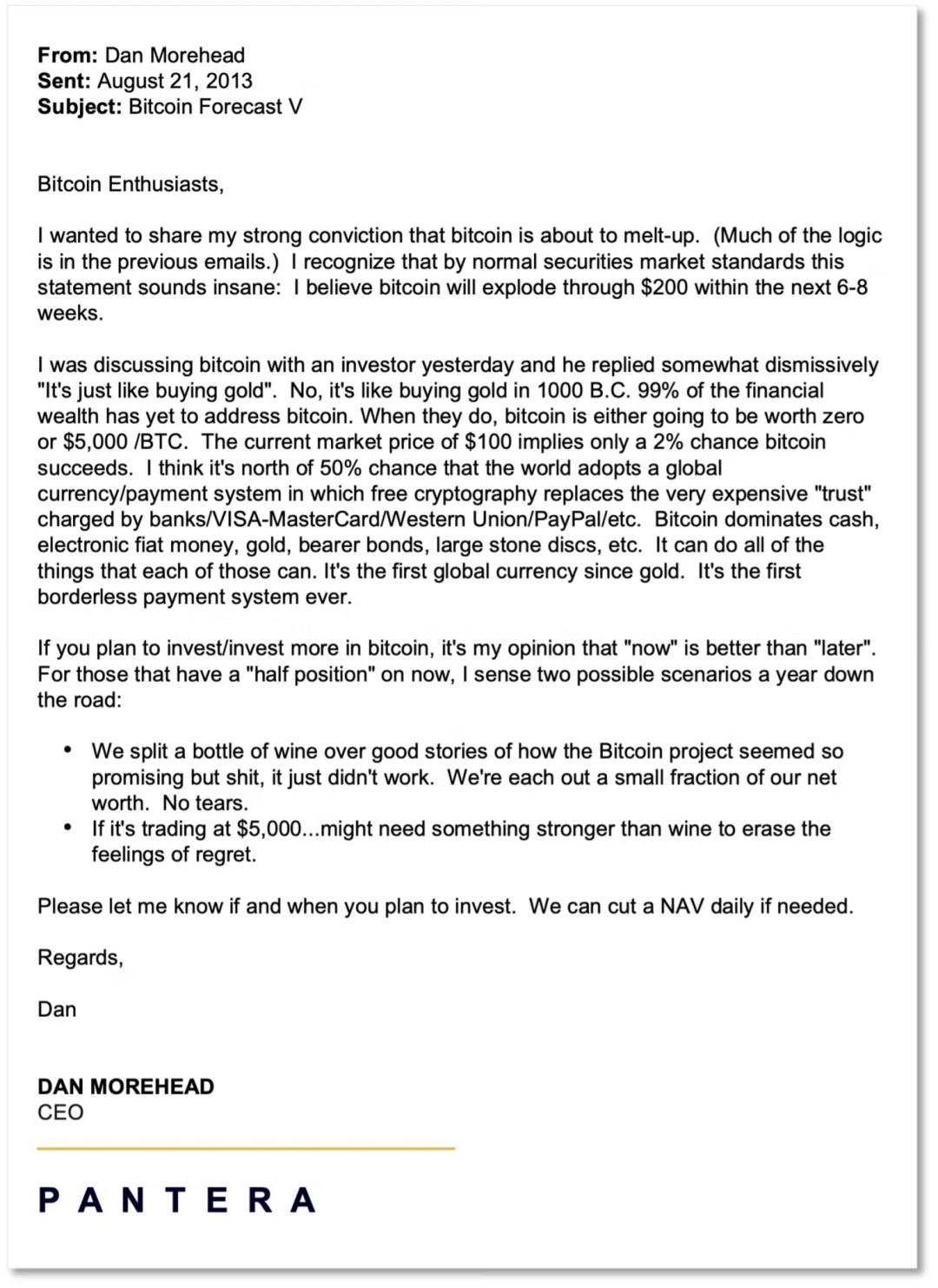
That’s still how I feel. We’re still early. 95% of financial wealth isn’t on the blockchain yet. They’re only just getting started with this massive revolution. When they are, Bitcoin could reach something like $740,000/BTC.
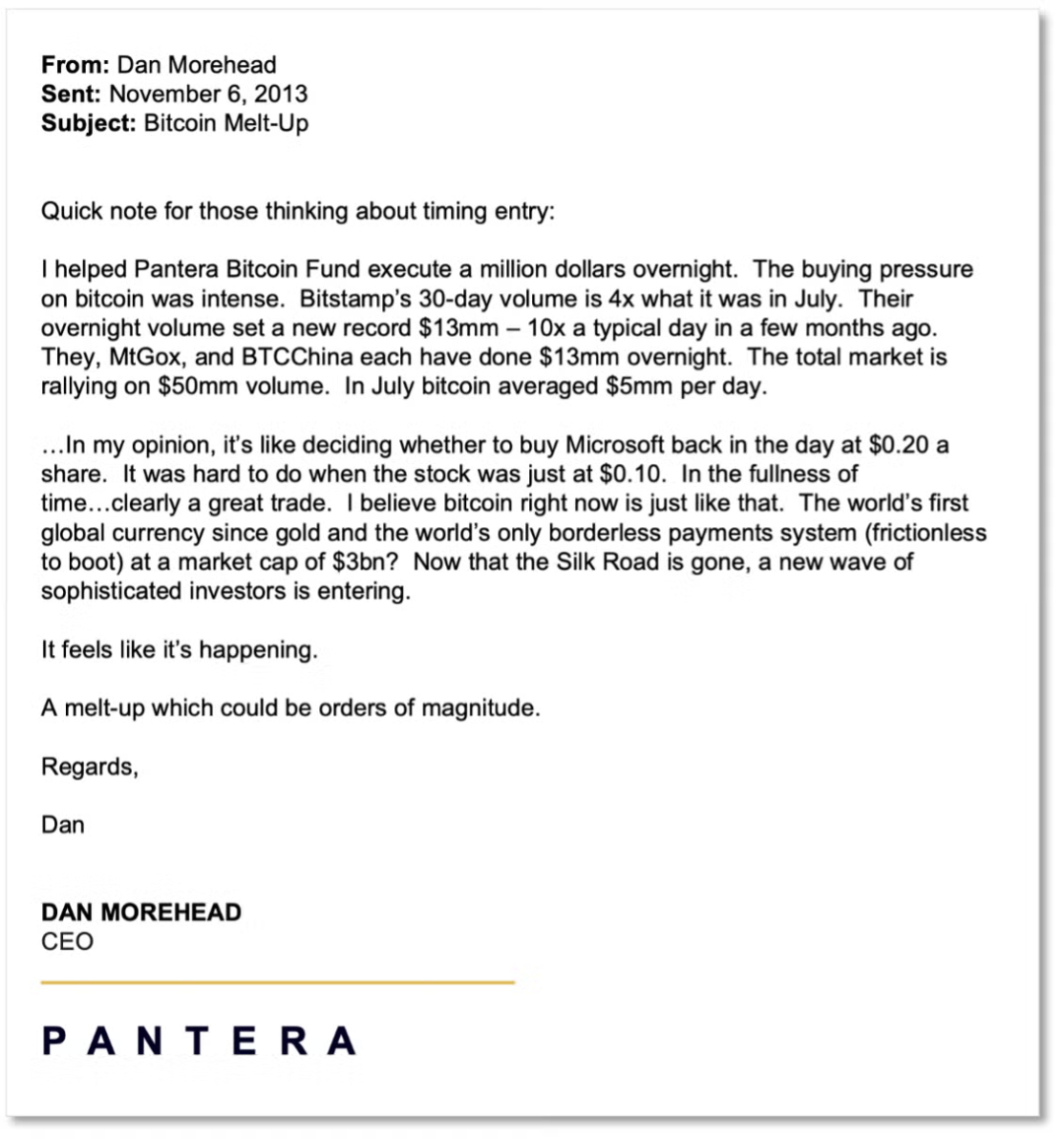
The market did see a rapid rise. It reached $1,000 in less than a month — and now it’s up three orders of magnitude.
11 years compound annual growth rate of 88%
I can imagine some investors thinking, “Bitcoin has already doubled this year. Well, I guess I missed out,” and giving up.
No, that mentality is wrong. Bitcoin’s average performance is almost doubling every year. Since we started the fund eleven years ago, its compound annual growth rate has been 88%.
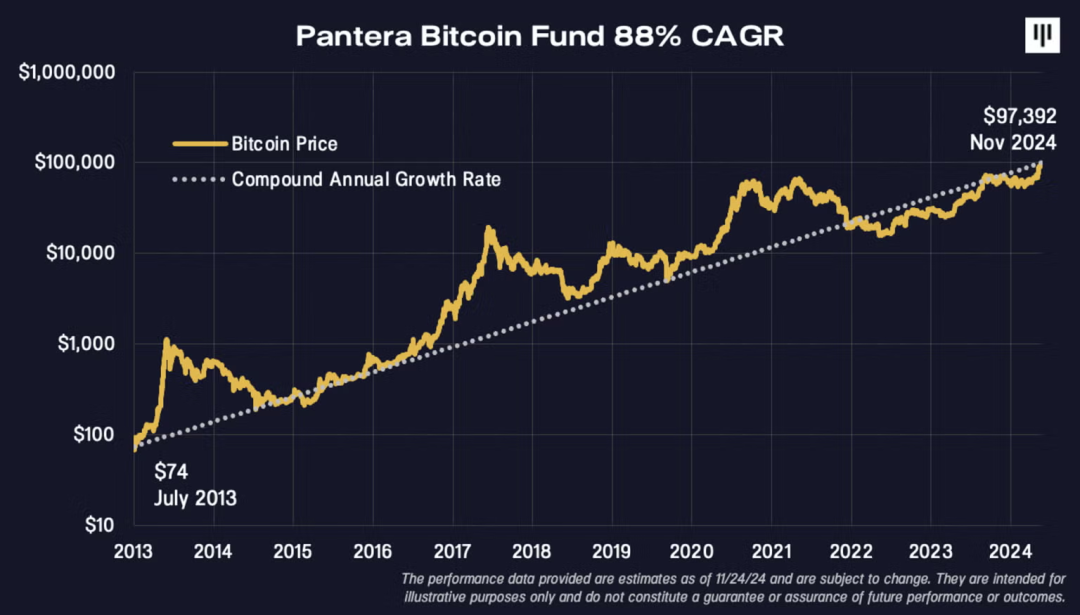
Order of magnitude growth
Bitcoin has already grown by three orders of magnitude. Another order of magnitude seems possible. If Bitcoin reaches $740,000/BTC, it would mean a market cap of $15 trillion. Compared to the total amount of financial assets of $500 trillion, this number is not unimaginable.
While past performance is not necessarily predictive of the future, if this trend continues, Bitcoin could reach $740,000 by April 2028.
I think it might take a few years longer, but I do think it's a possibility.
This has always been my mentality: I’m not betting my entire fortune on this, nor am I 100.00% certain that a blockchain asset will grow, but when you multiply the probability of it going up by an order of magnitude or more that it could increase — it’s a far better result than the expected return on other investable assets. The expected value on this deal is the most attractive I’ve ever seen in my nearly four decades of investing.
It’s not easy
It may seem obvious now, but it was very difficult at the time.
Bitcoin gradually lost popularity after the 87% crash that began in December 2013. The market has not recovered more than three years later. By 2016, almost everyone had lost faith in Bitcoin. Investors had no interest at all.
I flew around the world and did 170 investor meetings that year, and the end result of all this effort was that we raised only $1 million.
The management fee for this fund was $17,241. The average profit per meeting was $100.
We could have bought the hotel!!!
I am a loyal team player by nature. I always wanted Team Bitcoin to win. Over the years, we have always tried to help the community. So, when Expedia announced that it would accept Bitcoin in 2014, we paid all our travel expenses in Bitcoin.
In 2015, our team traveled 59 nights — an average of 1.5 BTC per night, for a total of 88 bitcoins.
That's the equivalent of $8,683,136 today!?!

We could have bought two hotels!
The incredible growth of the blockchain industry
In 2013, when we were getting ready to launch the Pantera Bitcoin Fund, I opened accounts at several exchanges and wired in funds to get ready. When I first walked into Wells Fargo from our Market Street office in San Francisco to wire money to Ljubljana, Slovenia, I didn’t even know how to spell Ljubljana. Everything seemed so fishy. So much so that the bank manager came over and grilled me for a long time about what I was doing.
But at the time, I wondered if I was crazy. Another wire was sent to a small startup that sounded equally suspicious.
At the time, the price of Bitcoin was around $130. Over the next few days, I watched the price of Bitcoin drop from $130 to under $100. It’s funny to think back, this “Fear, Uncertainty and Doubt” (FUD) is still the refrain of skeptics in today’s Bitcoin bear market. Even with all these issues, when it dropped to $65, I decided to go all in and start the Pantera Bitcoin Fund. My 30 years of trading intuition convinced me that that was where the opportunity was.
I sent the email mentioned above to a small list of Bitcoin enthusiasts, maybe twenty people at the time, saying, “I just want to get involved.”
I logged onto a startup called Coinbase and tried to buy 30,000 bitcoins. A pop-up window popped up, saying the fund’s daily limit was $50—not “$500,000” in Wall Street slang, but a real Ulysses S. Grant $50 bill. I nearly had a heart attack.
Since it was a hip startup, it had no address or phone number. I hastily sent an email—with a surprisingly all-caps subject line: “I want to buy $2 million worth of Bitcoin!” Four days later, their sole employee, a guy named Olaf, responded with “OK, your limit is now $300.” Even at my expanded trading limit, it would take 6,667 days to complete the transaction.
At this rate, I still have 2,522 days of trading to go!
Fortunately, I bought these Bitcoins on Bitstamp, and the industry has grown. Today, the cryptocurrency market has a daily trading volume of 130 billion US dollars. It is really amazing how far the industry has come.
Blockchain as an asset class
Sometimes I feel like an orangutan who finds a shiny object in the forest… picks it up… turns it around… wonders what it is…
Bitcoin!
I certainly don’t fully understand the nuances of all the incredible technical projects in this space, but I feel like I’ve seen similar scenarios before.
I was the first ABS trader at Goldman Sachs. Today, everyone considers ABS as an asset class. I was involved in the creation of the GSCI (Goldman Sachs Commodity Index). Today, everyone considers commodities as an asset class. In the 90s, I invested in emerging markets. Today, emerging markets (EM) are considered an asset class.
The same will happen with blockchain. I believe that in the near future, every investment firm will have a blockchain team and allocate a significant and long-term investment to blockchain.
Asymmetric transactions
My global macro background is what got me into blockchain in the first place. The asymmetric nature of this deal — operating in the largest market in the world — makes this opportunity far beyond what we’ve chased in the past on a global scale. I think it’s the most asymmetric deal I’ve ever seen.
The best illustration of this theme comes from a comparison at the 2nd Pantera Blockchain Summit in March 2014:
Over dinner before a late-night poker game, Morehead jokingly mentioned that the total value of all the bitcoins in the world at the time was roughly the same as Urban Outfitters, a company that sells ripped jeans and dorm decor — about $5 billion. ‘That’s crazy, right?’ Morehead said.
'I imagine that in a few centuries when they dig up the remains of our society like they did in Planet of the Apes, Bitcoin will probably have a bigger impact on the world than Urban Outfitters did. '"
—Nathaniel Popper, Digital Gold, 2015
When I updated this statement in November 2020, Bitcoin’s market cap was comparable to L’Oréal. Waterproof mascara is undoubtedly an amazing invention, but I still believe Bitcoin is asymmetric.
Digging deeper…
“At L’Oréal, our mission is to democratize the highest quality and accessible beauty products in skincare, makeup, haircare and color.”
That’s great. And Bitcoin’s mission sounds surprisingly similar: democratizing financial access.
I think democratization of finance will ultimately be more important.
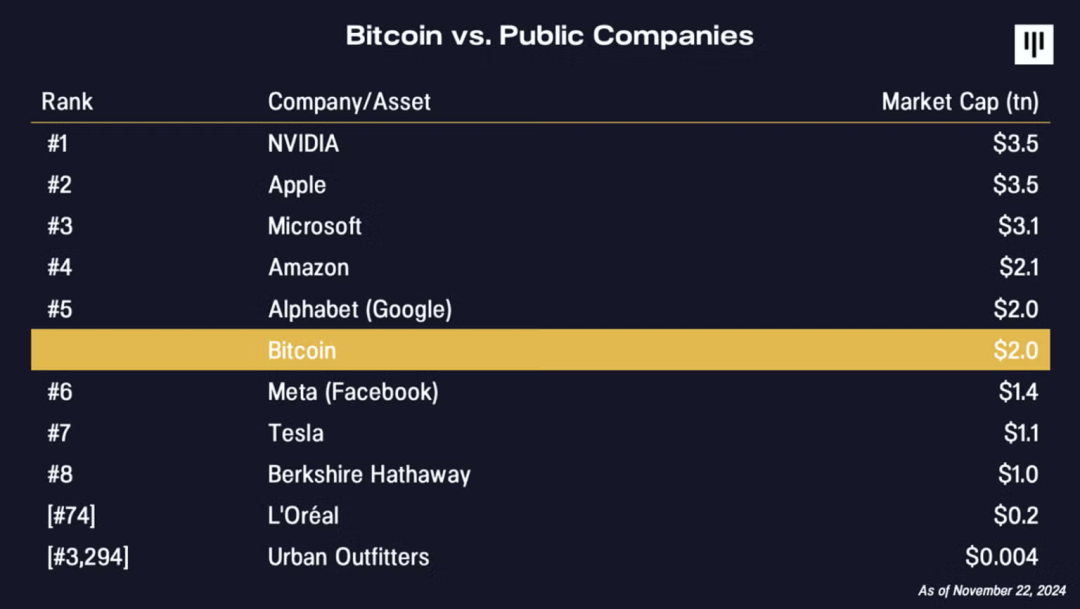
Bitcoin has recently surpassed Meta (formerly Facebook). Photo sharing is cool, but I think financial inclusion for every person on the planet with a smartphone will be much more meaningful.
There are five goals left to surpass...













